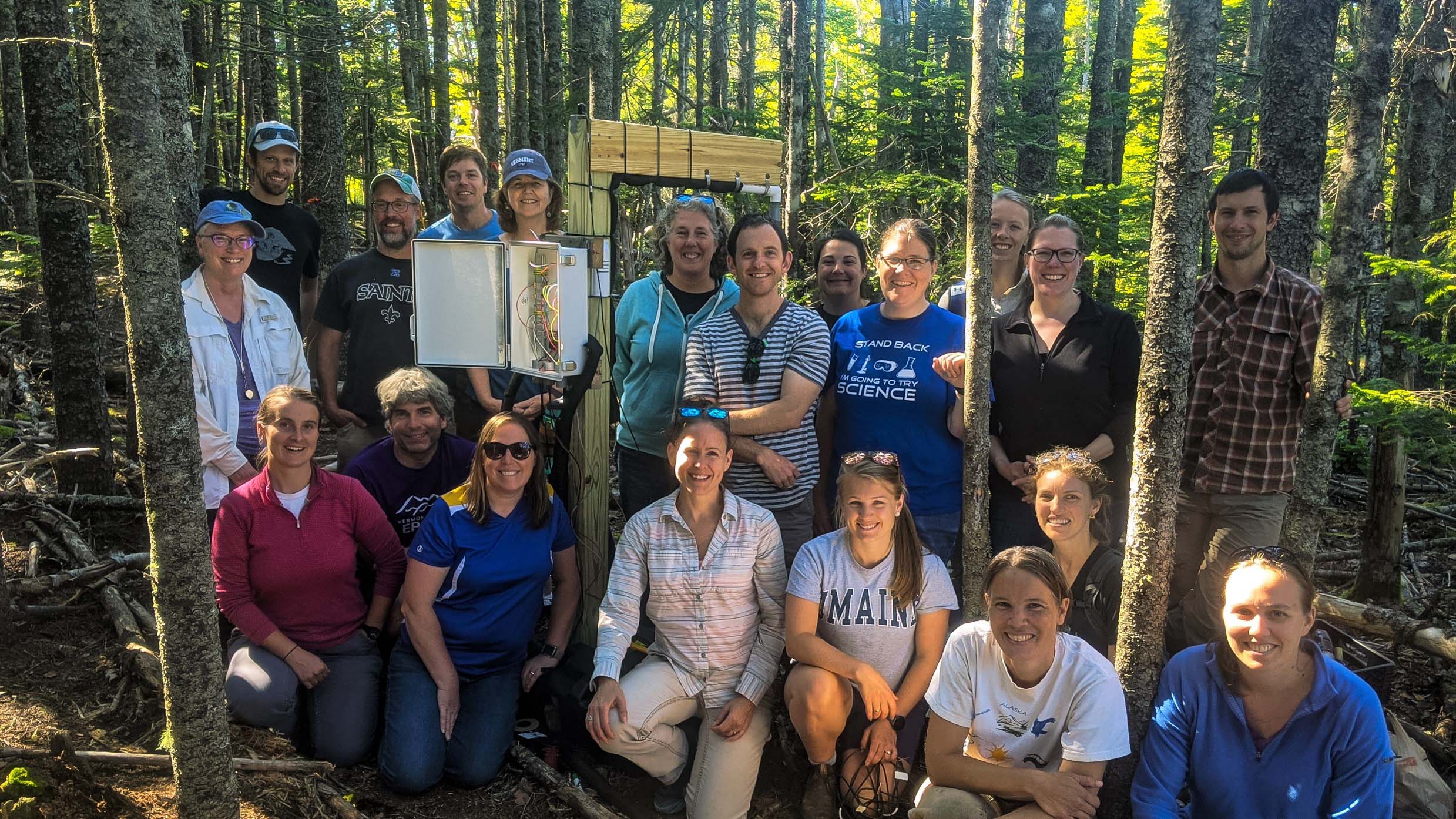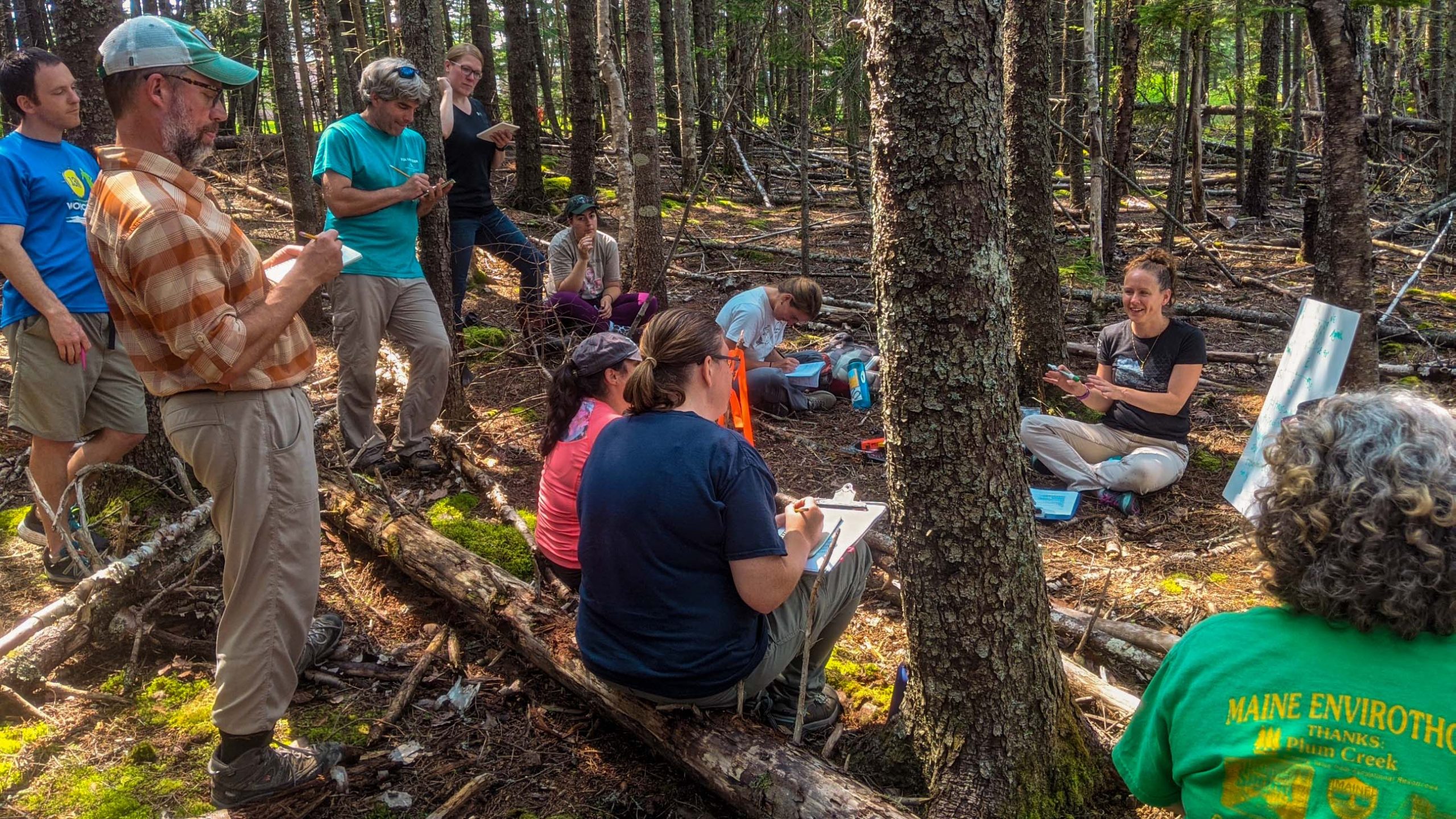
INSPIRES & the RiSE Center Partnership: STEM is a Community Collective
By Stefania Irene Marthakis
INSPIRES, an NSF EPSCoR RII Track-2 grant that focuses on gathering, analyzing, and utilizing data collected from across the Northern Forest Region, has partnered with the Maine Center for Research in STEM Education (RiSE Center), an interdisciplinary research center at the University of Maine. The RiSE Center provides support for twenty-two faculty members conducting educational research within their different STEM disciplines (e.g., chemistry, physics, mathematics, engineering) through various programs and projects.

Through INSPIRES’ teacher training program, education researchers gathered with middle and high school teachers from across Maine and Vermont in the summer of 2021 at Schoodic Institute in Maine. Working with INSPIRES researchers from the University of New Hampshire and the Schoodic Institute, teachers established a new research plot which included the installation of a Mayfly sensor station—which measures soil volumetric water content (VWC) and water potential, air temperature, humidity, snow depth, and photosynthetically active radiation (PAR).
INSPIRES and RiSE have provided a rare opportunity—especially in a science-based research project—for the teachers to act as researchers: develop and test their own hypothesis as well as collect data alongside INSPIRES project members of different disciplines.
“I cannot stress how much of an impact that had on the teachers. Because they got to do it and when the sensor comes online—they helped to set that up—their students can potentially use the data collected from the sensor. The teachers got to see the fieldwork and the high-tech coolness all at once,” Sara Lindsay (Assistant Director of the RiSE Center and UMaine Associate Professor of Marine Science) stated.
INSPIRES and RiSE also incorporate a theoretical framework called Quantitative Reasoning in Context (QRC) to talk about data, which include things that are fundamental to the research process (e.g., data literacy skills, ability to graph data and interpret graphs of data, thinking about research questions and the ability to respond to research questions using claims supported with data).
Laura A.M. Honders (RiSE Center Research and Evaluation Coordinator) hopes to answer these critical questions: “What level are students currently at, what are their math skills, their data skills, and what are the barriers to incorporating data into the classroom? How can we support teachers and craft something that is at an appropriate level for the students, but also gives them a window into this exciting research process that the INSPIRES project connects to?”
The RiSE Center focuses on—a tailored approach used throughout all their projects and programs—what the teachers are currently doing in the classroom and what do they want to change about their practice. Along with INSPIRES, they communicate the collective importance by bringing in outside people, ideas, resources, and locations. This community component introduces vitality to STEM curricula.
“If you think about project-based learning in tiers,” Dylan Harry (high school science teacher at Fryeburg Academy and the Director of the Outdoor Research and Learning Center) explained, “a project could be a poster about this topic, but the next level of complexity is something that mimics real life like the Model UN, and the next level of complexity is actual community initiative—where you have to problem solve and do all sorts of logistics and bring in people from outside the school. It has been a goal—and a hard one to attain—to involve that highest level of real experiences, so the INSPIRES project helps move me in that direction with respect to forests and forest research.”
With one summer institute successfully completed, the middle and high school teachers have formed three working groups. Each month the teachers work with faculty project members on crafting lessons for the classroom, which includes working with shared, common data sets and protocols as well as discussing topics like carbon flux within forests and supporting student data literacy skills.
In the 2021-2022 school year, teachers have been testing their designed lessons in the classroom, with five teachers also working to add their own Mayfly sensor stations to their respective schools. All while gearing up for the next summer institute that will be held at the University of Maine in Orono, July 18-22, 2022. Marina Van der Eb (Maine STEM Partnership Coordinator at the RiSE Center) said, “We’re hoping to include a field site visit to the University Research Forest, visit labs on campus, continue work with QRC, and finalize lessons, so that teachers can run them in their entirety during the 2022-2023 school year.”
“I think that is our biggest goal,” Honders stated, “is to provide the teachers a window into that process, the ability to do some work that connects to that, and for them to be able to provide that for their students as well. Because I think the process of doing research and building new knowledge—I want people to see how collaborative that is, how messy that is. It takes so much conversation, nobody holds all the pieces, everybody has different ideas.”
